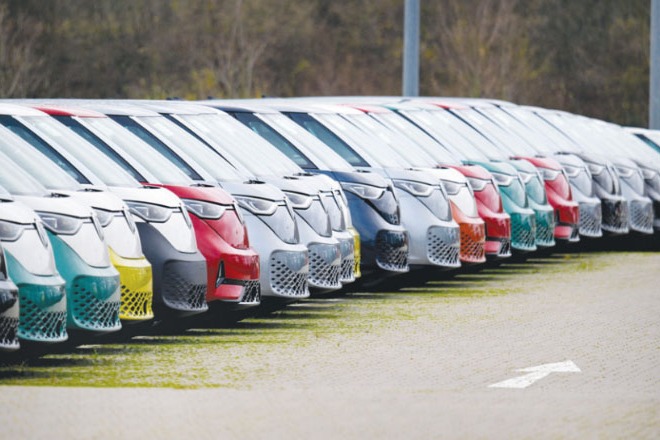How some European states distribute wealth


Four decades ago, almost everyone in China was poor by present-day standards. The Bund in Shanghai and Chang'an Avenue in Beijing were full of bicycles. No private cars.
Homes didn't have air conditioning. There was no milk. No yoghurt. Meat and eggs were available occasionally. And lack of nutrition stunted many children's growth.
Teenagers in China today cannot imagine the hardship and sacrifices their grandparents made.
Today, China is an epic success story. Across the world, China's progress, especially its rapid economic development, is lauded, sometimes even envied, which can be seen as a huge compliment. To make this achievement even more spectacular, China has been trying to develop a highly competent and non-corrupt army of civil servants. That Chinese officials, diplomats and judges are well trained and known to work outside of working hours could help China achieve that goal.
One reason for China's success is the opening up of the private sector, but the structure of Chinese society and socialism with Chinese characteristics have played an equally important role in that success. Yet the Western media, while attributing China's economic success to the opening up of the private sector, never mention China's social structure or socialism with Chinese characteristics.
Redistribution or proper distribution of wealth is a vital issue to consider after a country has achieved overall economic success. In fact, China's leadership is taking measures to ensure wealth is more equitably distributed among the population.
In this context, the methods some European countries have adopted offer some food for thought. Imposing higher taxes on rich people is a way of redistributing the relatively huge amounts of wealth accumulated by some people. In the Netherlands, for example, spouses/partners and children have to pay 10 percent tax on inheritance up to€126,723($148,925) and 20 percent for any inheritance above the threshold, and grandchildren 18 percent on inheritance up to €126,723 and 36 percent if it's above that limit. All others pay 30 percent tax on inheritance up to€126,723 and 40 percent on inheritance above that limit.
On the whole, in Europe, those who inherit wealth can't be shielded from taxation.
In feudal societies, land was the prime source of wealth. Owning land can still be a source of wealth, but the power that comes with owning land is very limited today. So tycoons and entrepreneurs nowadays accumulate wealth by establishing, selling and listing companies-to make and/or trade goods and services.
In many Western countries, the concept that the power of large companies must be handled by a group of individuals (usually board of directors) for greater common good is embedded in law, so that individual entrepreneurs do not abuse their position-as the landowners did in feudal societies.
Even in the United States, there are laws and market mechanisms against monopoly. In the early 20th century, Standard Oil owned by John D. Rockefeller became so wealthy and powerful that no company could compete with it. So in 1911, the US Supreme Court clipped Rockefeller's wings by declaring that Standard Oil was an "illegal" monopoly.
But the US is not a good example to follow when it comes to fighting monopoly and imposing higher rates of taxes on the rich, so as to more equitably distribute wealth, because according to a Forbes survey in June, people such as Jeff Bezos (Amazon founder and executive chairman), Bill Gates (Microsoft cofounder), Warren Buffett (CEO of Berkshire Hathaway) and Elon Musk (CEO of Tesla)-among the richest people in the world-pay on average 3.4 percent income tax.
In contrast, the Scandinavian countries have both income tax and inheritance tax, and also adopted laws to restrict the accumulation of excessive wealth by individuals and enterprises.
And in Germany, legislation prescribes that an enterprise with more than 2,000 employees or a listed company, other than keeping the majority of shareholders happy, also has to fulfil some socioeconomic responsibilities for the common good.
One way of realizing this goal is to take away the powers of the shareholders and give them to an independent supervisory board, which would act on behalf of all stakeholders-employees, shareholders, creditors including banks, the public and the authorities. A large company should not be an instrument to only make some people rich.
Should a company only serve the interests of the majority of shareholders? Should its only goal be to make as much profit as possible? Or should it consider the interests of its employees, the people that it earns its profits from, and the city and country where it is based?
Many in Germany say that a company should take into consideration not only the interests of the owners, top executives and other stakeholders but also work for the greater common good, which is also what corporate social responsibility means.
The German economy has been a great success, and wealth distribution in Germany is more equitable than in many other countries, because corporate governance in the country is based upon the common good.
True, China has adopted an anti-monopoly law, but it could borrow some of the German concepts in order to more equitably distribute wealth. In Germany, half of a supervisory board's members are elected by shareholders and the other by employees. And the members the employees elect are traditionally connected to a trade union or a labor organization. As a result, the power of the individual entrepreneurs in Germany to control the means of production and the products, and dictate terms to the employees for personal benefit is limited.
The author, a foreign exchange scholar at Tsinghua University from 2012 to 2015, is a lecturer at Leiden University and civil law notary at The Hague, the Netherlands.
The views don't necessarily represent those of China Daily.
If you have a specific expertise, or would like to share your thought about our stories, then send us your writings at opinion@chinadaily.com.cn, and comment@chinadaily.com.cn.
































